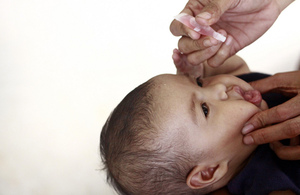Millions more protected against disease through improved vaccination programme
Millions more people will be protected against disease by improvements to the UK’s world class immunisation schedule, announced today.

Baby receiving oral vaccine
Millions more people will be protected against disease by improvements to the UK’s world class immunisation schedule, announced today, including 3 vaccination programmes to protect against flu, shingles and diarrhoea.
All children aged 2 - around 650,000 in total - will be offered a nasal flu vaccine from September 2013 as part of a comprehensive vaccination programme. A small number of pilots to vaccinate primary and pre-school aged children will run in some areas to make sure the NHS is ready to roll out the programme to all pre-school and primary school children next year. Pilots for secondary school children will run in some areas in 2014 in order to roll out the programme nationwide in 2015.
There will also be a shingles vaccination programme for people aged 70, with a catch-up programme for those aged up to, and including, 79. Older people are most at risk if they get shingles and a vaccination programme will prevent nearly 40% of the 30,000 cases seen every year in people over 70. The programme will begin in September 2013 and it is estimated that around 800,000 people will be eligible for the vaccine in the first year.
A rotavirus vaccination programme will start in July 2013 when children under 4 months will be vaccinated against rotavirus – a highly infectious bug that causes around 140,000 diarrhoea cases a year in under fives. It leads to hospital stays for nearly 1 in 10 – around 14,000 - of those who get it in the UK. It is estimated that the rotavirus vaccine will halve the number of vomiting and diarrhoea cases caused by rotavirus and there could be 70% fewer hospital stays as a result.
Director of Immunisation Professor David Salisbury said:
We already have a world class vaccination programme in place, which saves millions of lives each year, so I’m pleased that we will be able to protect even more people against disease starting later this year.
By offering new vaccines to two groups at the opposite end of the age scale, we can protect our most vulnerable against potentially harmful diseases. And the introduction of a teenage booster for Meningitis C will improve the protection given to young people.
Dr Mary Ramsay, Head of Immunisation at Public Health England said:
The introduction of the oral Rotavirus vaccine in the US and parts of Europe has had a major impact on preventing young children from developing this unpleasant vomiting and diarrhoeal disease. The vaccine is very easy to administer and involves placing a droplet of liquid into the babies’ mouths. In the countries where the vaccine has already been introduced, the uptake has been high and has resulted in rapid and sustained reductions in childhood rotavirus hospitalisations. We are excited to be offering this vaccine as part of the national infant immunisation programme in the UK.
As well as the rotavirus vaccine for infants, the upcoming introduction of childhood influenza and adolescent MenC immunisation programmes along with routine vaccination against shingles for older adults will all continue to contribute to our highly successful vaccination programme which we can boast in the UK.
The current arrangement for protecting people against meningitis C will also be updated. A new teenage booster jab given at age 12 to 13 will replace the booster that is currently given at 4 months old – as evidence shows the 4 month booster is no longer required. The teenage booster jab will be offered in the 2013 to 2014 academic year.
The decisions to introduce the new vaccination programmes and updates to existing programmes were made after the Joint Committee on Vaccination and Immunisation – the government’s independent vaccine experts - studied all the available evidence and advised that these changes are made to protect more people against disease.
The changes were announced in a letter signed by the Director General of Public Health in the Department of Health, the Chief Operating Officer in NHS England and the Medical Director / Director of Health Protection in Public Health England.
Currently, the Meningitis C vaccine is given as part of the Childhood Immunisation Programme at 3 months, 4 months and 1 year. The flu vaccine, Fluenz, is currently available to all children in at risk groups. A clinical study has shown that in adults aged 70 years and older the vaccine reduced the incidence of shingles by 38%. (Oxman et al. 2005). In those vaccinated that developed shingles, the vaccine significantly reduced the burden of illness by 55% in people aged 70 years and over.
- Photo above by the World Bank Photo Collection. Used under Creative Commons.